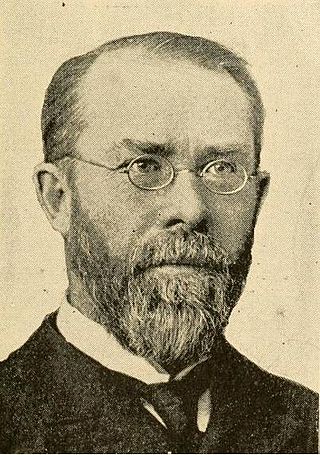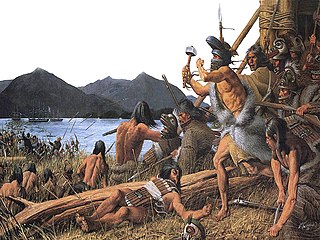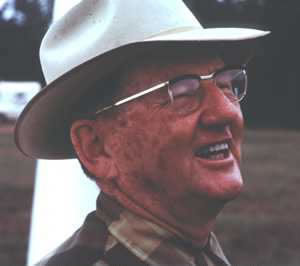Related Research Articles

The Tlingit or Lingít are Indigenous peoples of the Pacific Northwest Coast of North America and constitute two of the 231 federally recognized Tribes of Alaska. Although the majority, about 14,000 people, are Alaska Natives, there is a small minority, 2,110, who are Canadian First Nations.

The Bible has been translated into many languages from the biblical languages of Hebrew, Aramaic, and Greek. As of September 2023 all of the Bible has been translated into 736 languages, the New Testament has been translated into an additional 1,658 languages, and smaller portions of the Bible have been translated into 1,264 other languages according to Wycliffe Global Alliance. Thus, at least some portions of the Bible have been translated into 3,658 languages.
Partial Bible translations into languages of the English people can be traced back to the late 7th century, including translations into Old and Middle English. More than 100 complete translations into English have been produced. A number of translations have been prepared of parts of the Bible, some deliberately limited to certain books and some projects that have been abandoned before the planned completion.

The Douay–Rheims Bible, also known as the Douay–Rheims Version, Rheims–Douai Bible or Douai Bible, and abbreviated as D–R, DRB, and DRV, is a translation of the Bible from the Latin Vulgate into English made by members of the English College, Douai, in the service of the Catholic Church. The New Testament portion was published in Reims, France, in 1582, in one volume with extensive commentary and notes. The Old Testament portion was published in two volumes twenty-seven years later in 1609 and 1610 by the University of Douai. The first volume, covering Genesis to Job, was published in 1609; the second, covering the Book of Psalms to 2 Maccabees plus the three apocryphal books of the Vulgate appendix following the Old Testament, was published in 1610. Marginal notes took up the bulk of the volumes and offered insights on issues of translation, and on the Hebrew and Greek source texts of the Vulgate.
Middle English Bible translations (1066–1500) covers the age of Middle English, beginning with the Norman Conquest and ending about 1500.

The Tlingit language is spoken by the Tlingit people of Southeast Alaska and Western Canada and is a branch of the Na-Dene language family. Extensive effort is being put into revitalization programs in Southeast Alaska to revive and preserve the Tlingit language and culture.

Wycliffe's Bible or Wycliffite Bibles or Wycliffian Bibles (WYC) are names given for a sequence of Middle English Bible translations believed to have been made under the direction or instigation of English theologian John Wycliffe of the University of Oxford. They are the earliest known literal translations of the entire Bible into English. They appeared over a period from approximately 1382 to 1395.

Sheldon Jackson was a Presbyterian minister, missionary, and political leader. During this career he travelled about one million miles and established more than one hundred missions and churches, mostly in the Western United States. He performed extensive missionary work in Colorado and the Alaska Territory, including his efforts to suppress Native American languages.

The Battle of Sitka was the last major armed conflict between Russians and Alaska Natives, and was initiated in response to the destruction of a Russian trading post two years before. The primary combatant groups were the Kiks.ádi Clan of Sheetʼká Xʼáatʼi of the Tlingit nation and agents of the Russian-American Company assisted by the Imperial Russian Navy.

William Cameron Townsend was an American Christian missionary-linguist and the founder of Wycliffe Bible Translators and the Summer Institute of Linguistics.

William Duncan was an English-born Anglican missionary who founded the Tsimshian communities of Metlakatla, British Columbia, in Canada, and Metlakatla, Alaska, in the United States. Although sometimes referred to as "Father Duncan" in subsequent reports, he was never ordained.

Nora Marks Keixwnéi Dauenhauer was a Tlingit poet, short-story writer, and Tlingit language scholar from Alaska. She won an American Book Award for Russians in Tlingit America: The Battles of Sitka, 1802 And 1804. Nora was Alaska State Writer Laureate from 2012 - 2014.

Richard Dauenhauer was an American poet, linguist, and translator who married into, and subsequently became an expert on, the Tlingit nation of southeastern Alaska. He was married to the Tlingit poet and scholar Nora Marks Dauenhauer. With his wife and Lydia T. Black, he won an American Book Award for Russians in Tlingit America: The Battles of Sitka, 1802 And 1804. He has translated works into German, Russian, Finnish, and Classical Greek.

Castle Hill also known as the American Flag-Raising Site and now as the Baranof Castle State Historic Site, is a National Historic Landmark and state park in Sitka, Alaska. The hill, providing a commanding view over the city, is the historical site of Tlingit and Russian forts, and the location where Russian Alaska was formally handed over to the United States in 1867. It is also where the 49-star United States flag was first flown after Alaska became a state in 1959.

Lydia T. Black was an American anthropologist. She won an American Book Award for Russians in Tlingit America: The Battles of Sitka, 1802 And 1804. She also received a Historian of the Year award from the Alaska Historical Society.
The complete Bible has been translated into three of the dialects of Inupiat language, the New Testament in two more and portions in another.
Biblical translations into the indigenous languages of North and South America have been produced since the 16th century.

The Athabaskan language family is divided into the Northern Athabaskan, Pacific Coast Athabaskan and Southern Athabaskan groups. The full Bible has been translated into two Athabaskan languages, and the complete New Testament in five more. Another five have portions of the Bible translated into them. There are no Pacific Coast Athabaskan languages with portions of the Bible translated into them.
References
- ↑ Alaska Native Languages in Russian America, By Dr. Michael Krauss. In "Russian America, the Forgotten Frontier", Edited by Smith and Barnett. Pg 210
- ↑ "The Lord is my goat hunter". SIL International. 2013-01-24. Retrieved 2016-11-13.
- ↑
- Black, Lydia T.; Dauenhauer, Nora; Dauenhauer, Richard (2008), Russians in Tlingit America, University of Washington Press, p. 449, ISBN 978-0-295-98601-2 .
- ↑ SitNews. "SitNews: Native Rights Leader Turns 102 By DAVE KIFFER". www.sitnews.us. Retrieved 2016-11-13.